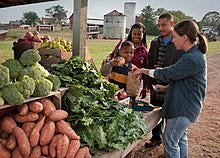Families, Others At Risk Under Proposed Rule That Would Take Food Aid Away
Republicans pushing even stricter work requirements for SNAP benefits
More than 10 million people — about 1 in 4 participants in the federal Supplemental Nutrition Assistance Program (SNAP) — are in jeopardy of losing food because a group of Republicans would dramatically expand SNAP’s already harsh work requirements.
That's according to a recent report by a well-known think tank in Washington DC.
As Congress works through federal budget proposals and prepares to reauthorize SNAP — formerly known as “food stamps” — in the pending farm bill, that gives these Republican lawmakers their opportunity to try to make their onerous changes, according to the Center for Budget and Policy Priorities (CBPP).
A vast number of SNAP recipients across the country already are having to absorb the recent dramatic loss of their higher benefits from the pandemic era, which came to an end with the February payments.
One bill, from House Agriculture Committee member Dusty Johnson of South Dakota, and more than 20 other House Republicans, would dramatically expand SNAP’s already harsh work requirements, CBPP analysts said.
“The bill’s approach — conditioning access to basic food assistance on documenting hours of work or work activity ― is based on several false assumptions,” their report said. “The first is the notion that people who receive benefits do not work and must be compelled to do so. Most SNAP participants who can work do work, and claims to the contrary are often rooted in prejudices about people based on race, gender, disability status, and class.
“It also ignores the realities of the low-paid labor market, the lack of child care and paid sick and family leave, how health and disability issues and the need to care for family members affect people’s lives, and ongoing labor market discrimination,” the report added. “And numerous studies have found that SNAP work requirements like these don’t improve employment or earnings, they just cut people off from the food assistance they need to buy groceries.”
Johnson’s bill — HR 1581, the America Works Act — would expand the population of people subject to SNAP’s existing work requirement, which operates as a time limit. If over three months someone is unable to document they work or participate in a qualifying employment and training program for at least 20 hours a week, they are cut off from SNAP benefits — and aren’t eligible again until a total of three years has passed.
“Under H.R. 1581, for the first time adults up to age 65 (instead of the current age of 50) and adult participants who live in a household with school-age children would be subject to these requirements and at risk of losing benefits,” the CBPP report said. “The bill also would take away states’ existing flexibilities to waive this punitive work rule in areas with insufficient jobs, a flexibility that every state but one has used since the requirement was put into place in the mid-1990s.”
Food for some 4 million children could be at-risk if this new legislation were to become law.
Examples of other groups that are at risk of losing SNAP benefits, according to CBPP, include: veterans, unhoused individuals, victims of domestic violence, adults with undiagnosed health conditions, adults who lost jobs when businesses closed or downsized, people working to recover from a substance use disorder, people returning from incarceration who face high barriers to employment, and young adults aging out of foster care, who may be in unstable situations and unable to work a steady 80 hours a month.
Please support our work…
Also, please subscribe…





